Complaint Filed with EC Against Lack of Free Movement for Same-sex Couples in Hungary

ILGA-Europe, alongside a Hungarian activist organisation, have filed a complaint against Hungary because of its refusal to implement the 2018 Coman judgement, which recognises that the term “spouse” includes same-sex spouses under EU freedom of movement laws.
Just ahead of the fourth anniversary of the ground-breaking 2018 Court of Justice of the European Union (CJEU) judgement giving freedom of movement to same-sex couples in the EU (Coman vs. The Romanian State), ILGA-Europe, alongside Hungarian LGBTI organisation, Háttér Society and supported by the law firm White and Case, have filed a complaint with the European Commission because of Hungary’s non-compliance with the judgement.
With a complaint already pending on Romania because it has not implemented the 2018 ruling, and is thus disrespecting EU law, proof has also been provided that Hungary also continues to ignore the judgement and is prohibiting freedom of movement for same-sex couples.
The Hungarian state body in charge of granting recognition to foreign marriages and foreign partnerships refuses to recognise same-sex marriages legally concluded in jurisdictions of other EU Member States, as obliged by the 2018 Coman ruling, thus impeding freedom of movement within the EU and breaching EU law.
The refusal of the Hungarian State to comply with the Coman judgment is illustrated in a recent opinion issued by the Hungarian Ministry of Justice, which, in essence, states that the validity of a foreign marriage should be assessed under the country’s International Private Law Act (IPLA). Under the IPLA, a foreign marriage shall only be valid if the legislative conditions in the countries of both spouses country laws are satisfied, in other words the laws of the States of which the spouse is a national. According to sec. 12(1) of the IPLA, however, foreign law is not applied if the result of its application would violate fundamental values and constitutional principles.
Following the standpoint adopted by the Ministry of Justice, the Hungarian authorities deprive the following same-sex couples of marriage recognition (and thus freedom of movement):
- A same-sex marriage legally concluded abroad (including in other EU jurisdictions) with a Hungarian national. The Hungarian authorities do not allow for a recognition of a same-sex marriage with Hungarian nationals since Hungarian law does not provide for same-sex marriage.
- A same-sex marriage legally concluded abroad (including in other EU jurisdictions) where both of the spouses personal laws allow for same-sex marriage. The Hungarian authorities do not allow for recognition of same-sex marriage, because they consider it contrary to Hungarian public policy, and in alleged violation of the fundamental values and constitutional principles of the Hungarian legal system.
Active Steps To Make Life for Same-sex Couples More Difficult
In addition, requests for recognition of foreign same-sex marriages have not merely been denied, the Hungarian State has also taken active steps to make the lives of same-sex couples even more difficult than they were at the time the Coman ruling was delivered.
Since 2019, third-country nationals (non-Hungarian, non-EU) cohabiting with a Hungarian citizen, whether formally registered with public notaries as cohabiting partners or not, are no longer considered as their “family member,” thereby denying them basic immigration rights. This additional hurdle has worsened the conditions of same-sex couples in Hungary. Whereas the recognition of same-sex marriages has always been denied, third-country nationals living with a Hungarian citizen outside of a registered partnership will now also be denied the right to reside permanently in Hungary.
This situation is in clear violation of EU law and the 2018 Coman ruling of, as well as Art. 21(1) and Art 4(3) of the Treaty on the Functioning of the European Union (TFEU) and the Directive 2004/38/EC on the right of citizens of the Union and their family members to move and stay in the territory of the Member States.
The landmark Coman ruling was adopted four years ago, recognising that the term “spouse” includes same-sex spouses under EU freedom of movement laws. The ruling was supposed to provide same-sex spouses with much-awaited freedom of movement and long-overdue equal treatment throughout the EU. However, on its fourth anniversary, not only has Mr Hamilton, the spouse of Mr Coman, still not been granted residency in Romania, but legislation in both Hungary and Romania continues to violate the right to freedom of movement for same-sex couples.
The CJEU explicitly held that the refusal to recognise the same-sex marriage of an EU citizen, which constitutes a restriction of their right to move and reside freely within the EU under Art. 21(1) TFEU (Coman, § 40), cannot be justified on public policy and national identity grounds (Coman, §§ 41-50). Numerous administrative procedures have been pursued in Hungary, notably by Háttér Society. Háttér assist same–sex couples to apply for domestic registration of their same–sex marriage concluded outside Hungary, either as marriage or as a registered partnership, in order to obtain a right of residence. Such applications have, to date, always been rejected.
According to Katrin Hugendubel, Advocacy Director with ILGA-Europe, “We urge the Commission to investigate the complaints filed regarding Hungary and Romania, and to take all steps at its disposal, to ensure that Hungary, Romania, and indeed all Member States, respect the Coman ruling at the Court of Justice of the European Union. In essence, the ruling states that all EU member states are obliged to recognise legally concluded same-sex marriages in other member states, whenever this is necessary to secure the freedom of movement of the same-sex spouse.”
A.B. and K.V. v Romania
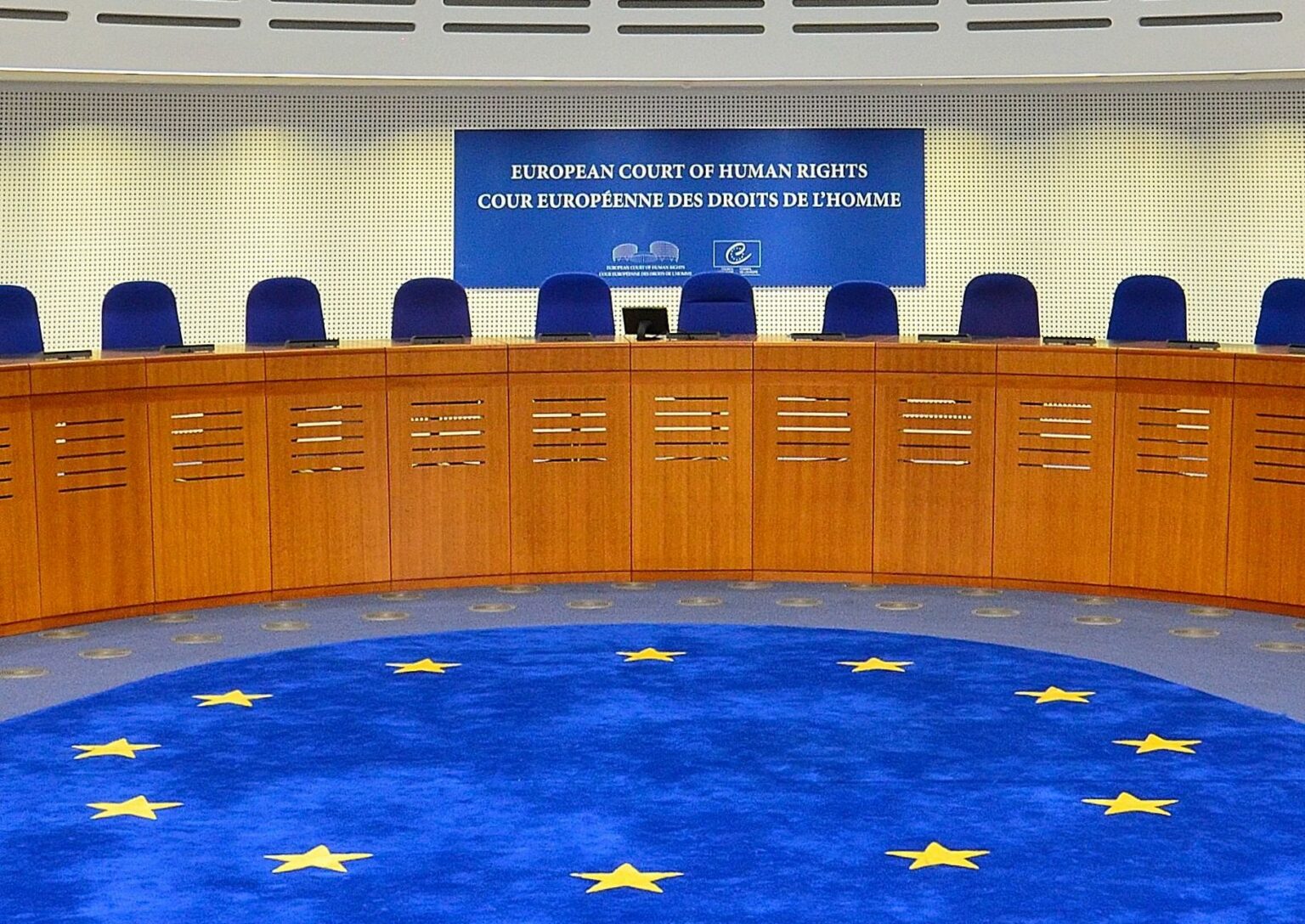
Recognition of same-sex marriages in the context of freedom of movement in the EU through the prism of implementation of CJEU’s Coman judgment
Submitted jointly by ILGA-Europe and AIRE Centre
Coman and Others v Romania

Recognition of same-sex marriages in the context of freedom of movement in the EU through the prism of implementation of CJEU’s Coman judgment.
Submitted jointly by AIRE Centre, ICJ and ILGA-Europe.
Freedom of movement for same-sex spouses: The Coman Case, 3 years on

On 5 June 2018, the Court of Justice of the European Union (CJEU) issued a landmark judgement against Romania, recognising that the term spouse includes same-sex spouses under EU freedom of movement laws. Three years later, Clai Hamilton, spouse of Romanian citizen Adrian Coman, has not been granted residency yet. Now they’ve brought the case to the European Court of Human Rights (ECHR). Here, Adrian Coman talks about the original case, and his hopes with this latest development.
When Adrian Coman and Clai Hamilton first met, they did not know that the love they’d found would ultimately change the lives of rainbow families in the European Union. In 2010, while working at the European Parliament in Belgium, Adrian married Clai, a US citizen living in Brussels. Two years later, they decided to move and settle together in Adrian’s home country of Romania.
However, the Romanian authorities chose not to follow EU laws and refused to recognise their marriage, so Clai was not able to apply for a residence permit. Almost a decade on, the situation remains the same.
“I’m sorry to say that change in Romania has always come from abroad,” Adrian Coman told us in an interview for The Frontline, ILGA-Europe’s podcast. It was a decade ago, in 2001, that Romania repealed Article 200, which criminalised homosexual relationships, after receiving pressure from the EU with whom accession talks were taking place. Since then, the one relevant LGBTI related legal change in Romania has been an amendment to the Civil Code, prohibiting same-sex marriages and partnerships, and the recognition of those if they happened abroad.
“What I see is a resistance to change,” says Adrian of his home country. “Some governments think that a majority of Romania is against anything that has to do with LGBT people, therefore resist been seen as operators of change.”
A landmark court case
In 2012 the couple turned to courts to have their marriage recognised for Clai to be able to have residence rights. Six years later, on 5 June 2018, the Court of Justice of the European Union (CJEU) delivered a judgment in favour of Adrian and Clai. It said that the definition of ‘spouse’ in EU law on freedom of movement includes same-sex couples. EU citizens and their families have the right to travel and reside freely within the territory of Member States.
The CJEU’s judgment meant that all EU countries must treat same-sex couples in the same way as different-sex couples when they exercise freedom of movement rights.
“This was a huge achievement,” says Arpi Avetisyan, Head of Litigation at ILGA-Europe. Arpi remembers celebrating when the judgement was published. It was great news for Adrian, Clai and all rainbow families in the EU. There was a sense of happy ending, not only with the case, but also with the positive media exposure it received. Other couples in a similar situation began to tell their stories.
A rollercoaster struggle
However, it’s 2021 and Romania still has not implemented the EU judgment. Adrian and Clai’s marriage has not been recognised in the country and Clai remains unable to apply for residency.
“This case has been like a rollercoaster in a way,” says Arpi Avetisyan. “The struggle continues to ensure the judgment come a reality.”
Now, Adrian and Clai, with the help of ACCEPT , have submitted their case to the European Court of Human Rights (ECHR). “We are very optimistic,” says Adrian about the forthcoming decision. “While we never know how courts will decide, I think all the measures from the higher courts have been favourable. And it’s not surprising because I think the law [in Romania] has not been keeping up with the reality in society. We’ve only seen support and that’s the real change.
“One reason why we’ve stayed in it for so long it’s because we realised it’s no longer about the two of us. Clai and I are very lucky. We live in New York. I happen to be an American citizen at the same time, and we are here, recognised as spouses. We have the choice of not going to Romania now, of waiting… but other people don’t. We recognise the privileges that we have and we have to use them for those who are not in the same situation.”
Watch this space for the European Court of Human Rights decision on Adrian and Clai’s case, and listen to our full podcast below.
Rainbow Family Rights in Europe – Part 1: The Coman Case Three Years On
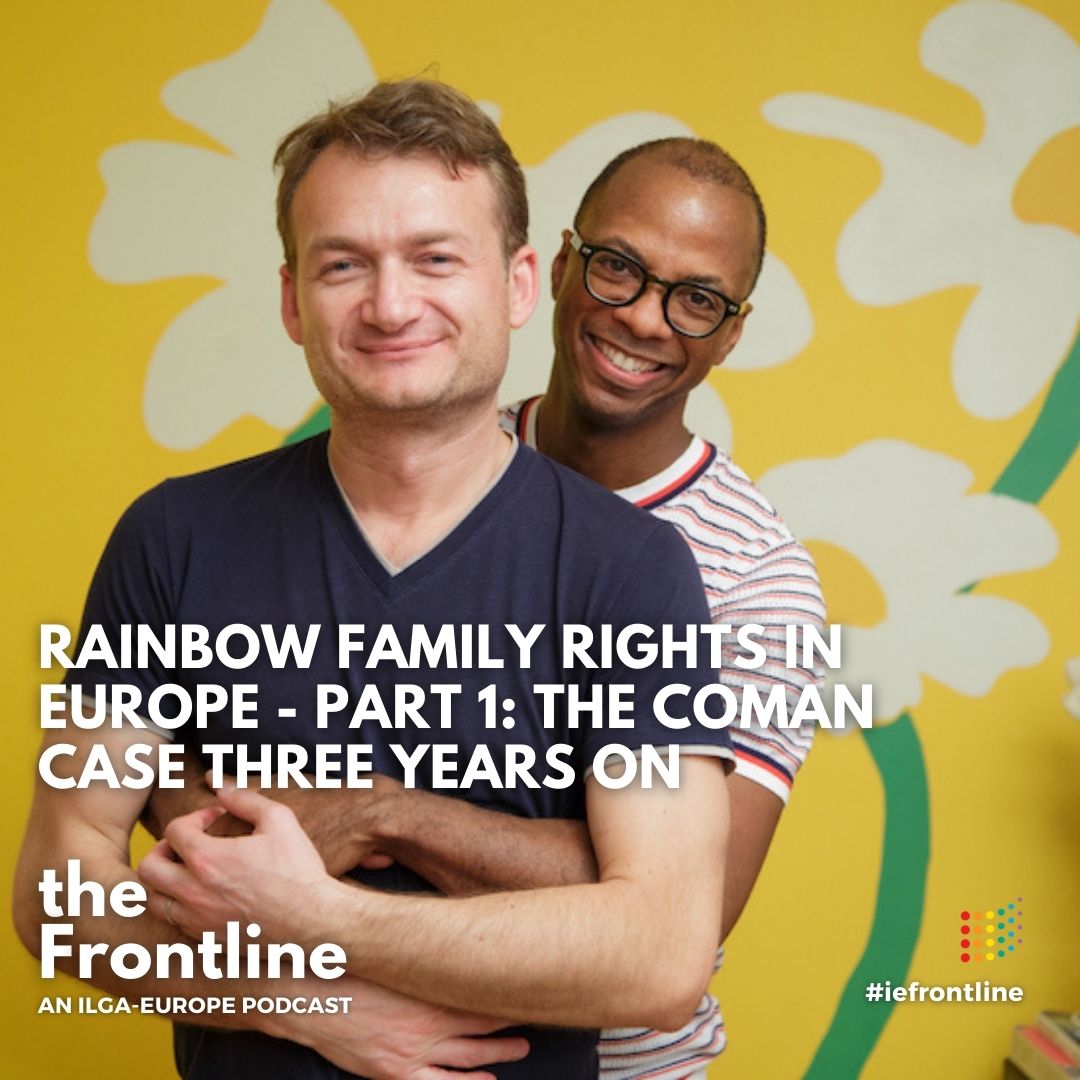
Three years ago, Adrian and his partner Clai were successful bringing their case to the Court of Justice of the European Union, which judged that same-sex spouses are fully recognised as spouses under the EU freedom of movement directive.
As a result, Adrian and Clai, who is American, should have been granted a residence permit in Romania. To this day, the judgement has not been enacted by the Romanian state, and in December 2020, the couple took their case to the European Court of Human Rights to finally get their rights recognised.
We’re also joined by Arpi Avetisyan, head of litigation at ILGA-Europe, to talk about the wider implications of the latest developments in the Coman case.
Is The EU an LGBTIQ Freedom Zone?
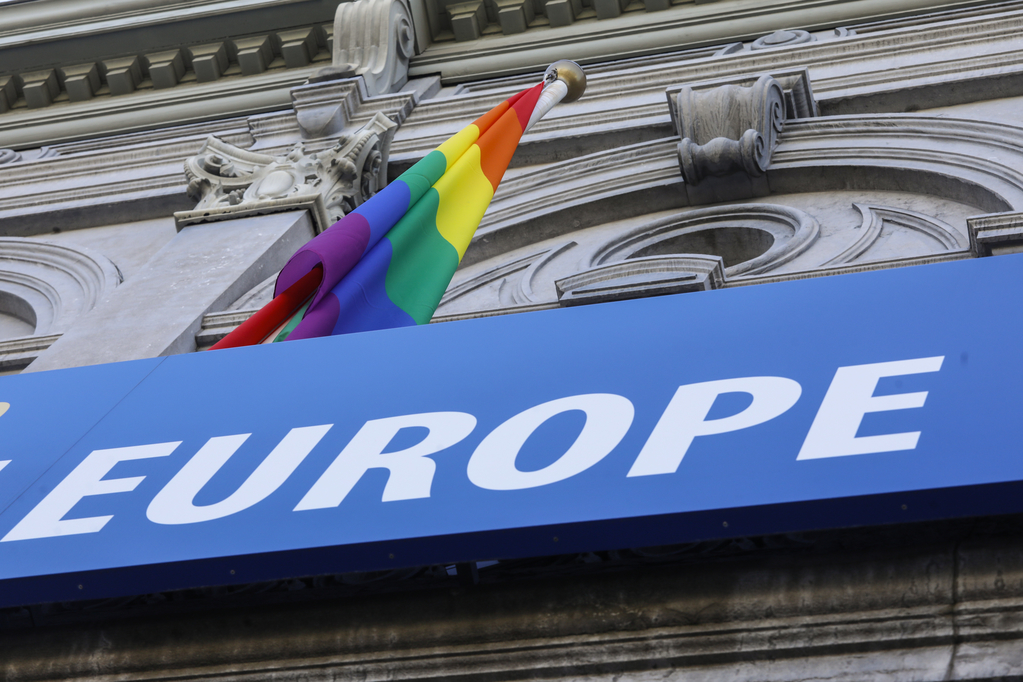
The ambition is right, but the reality is very different, says leading European LGBTI rights organisation
In response to the proliferation of over 100 so-called ‘LGBT-Free zones’ in Polish municipalities, the European Parliament today is debating a resolution declaring the EU an LGBTIQ Freedom Zone. It’s a strong symbolic gesture, but clear action needs to follow to make this a lived reality, according to ILGA-Europe.
The European Parliament (EP) in this weeks plenary session will debate and adopt a Resolution declaring the European Union (EU) an LGBTIQ Freedom Zone. Europe’s leading LGBTI organisation, ILGA-Europe, say much work needs to be done to align the resolution with the truth of LGBTI people’s lives in Europe.
According to Katrin Hugendubel, Advocacy Director with ILGA-Europe: “It is great to see the European Parliament wants the EU to be an ‘LGBTIQ Freedom Zone’, in other words a space where LGBTIQ persons can be who they are and love whom they love, free and safe. At ILGA-Europe, our day-to-day work reminds us very clearly that a lot still needs to be done to makes this a reality across the EU. We need to see more concrete action, from the European Commission, the European Parliament, the European Council, as well as national governments and policy-makers, and from regional and local authorities.”
Last month, ILGA-Europe published its ‘Annual Review of the Human Rights Situation of LGBTI People in Europe and Central Asia 2021’, clearly setting out how far the reality of LGBTI people across the EU is from living in a ‘freedom zone’.
Beyond the stories about Poland and Hungary, which have made most of the anti-LGBTIQ headlines in recently, there are so many ways in which the EU and its member states are falling short of ensuring LGBTI are free and equal in the EU, including:
- Member states such as Portugal and Italy have yet to legislate to protect LGBTI people against discrimination outside the labour market.
- The CJEU judgement in the Coman case, which three years ago established that same-sex spouses are fully recognised as spouses under the EU freedom of movement directive, has to this day not been enacted by the Romanian state, and the partner of Adrian Coman still has not been granted a residence permit in Romania, leaving other same-sex couples in similar situations in limbo.
- Children of a same-sex couple can lose one parent just by crossing an EU border, while the recent case of a child born to a same-sex couple not being recognised by the Bulgarian authorities, currently leaves that child stateless.
- Two years after the introduction of the first LGBT-free Zones and Family Rights declarations in Poland, the EC still has not brought infringement procedures against the Polish government, even though such declarations clearly infringe on the principle of non-discrimination set out, for example, in the EU employment directive.
- Only Malta, Portugal and some regions in Spain have banned non-medically necessary surgeries on intersex children.
- The Czech Republic, Finland, Latvia, Romania and Slovakia still require trans people to be sterilised before having access to legal gender recognition, while Hungary last year abolished any procedure to have legal gender recognition for trans people recognised.
Hugendubel added: “To ensure the EU will become a true LGBTIQ freedom zone, the Commission has to make full use of all tools in its box. It should ensure full implementation of all relevant EU directives and CJEU judgements in every member state. It should ensure that all member states spend EU funding in full respect of the principle of non-discrimination and respect for fundamental rights. It has to hold EU governments accountable to the principles set out in the EU treaties and the Charter for Fundamental Rights.”
According to Evelyne Paradis, Executive Director of ILGA-Europe: “It is great to see clear commitments to LGBTIQ equality from the European Parliament through this resolution, as well from the European Commission through the ‘EU LGBTIQ Equality Strategy’. Now that the EU is an LGBTIQ Freedom Zone, we need to see all actors using the full range of tools at their disposal to ensure that respect of LGBTIQ rights is guaranteed. Otherwise there is a big risk of losing credibility.”
For further comment, contact: Ana Muñoz Padrós, ILGA-Europe: ana@ilga-europe.org, +32 493 35 60 55
European Court will consider lack of implementation of EU law to enable freedom of movement for same-sex spouses

Almost three years after the European Court ruled that Romania must recognise a same-sex couple under EU freedom of movement legislation, its government is yet to implement the judgement.
In June 2018, the Court of Justice of the European Union (CJEU) issued a landmark judgement, recognising that same-sex spouses are also spouses under EU freedom of movement laws. Almost three years later, Romania has still not respected the judgement by granting the male spouse of a Romanian man a residence permit in Romania. Together with Romanian LGBTI oganisation ACCEPT, the couple has now taken the case to the European Court of Human Rights to address this failure of implementation of the CJEU judgement and finally get their rights recognised.
In the ground-breaking judgment of Relu Adrian Coman and Others v Inspectoratul General pentru Imigr?ri and Ministerul Afacerilor Interne (Coman and Others), delivered on 5 June 2018, the CJEU clarified that the term ‘spouse’ in the EU Freedom of Movement Directive (2004/38/EC) includes same-sex spouses, and that Romanian authorities must ensure that EU law is implemented equally and duly, without discrimination based on one’s sexual orientation. In practice this means that Romania must recognise same-sex partnerships from other EU countries, and therefore needs to grant a residence permit to Adrian Coman’s partner and others in similar situations.
In line with the CJEU judgment, the right to family life of same-sex couples was reaffirmed by the Constitutional Court of Romania in July 2018, yet Romania continues to refuse to acknowledge the judgments and provide the residence permit. ACCEPT has brought this to the European Commission’s (EC) attention by submitting a complaint about a second case, similar to Coman. However, what we keep hearing from the EC is that in order to start infringement procedure, the EC would have to establish a ‘general and consistent’ non-application of EU legislation, which according to the services is difficult to establish.
According to Teodora Ion Rotaru of ACCEPT Romania: “We rely on the European Commission to ensure that member states correctly implement hard-won rights, like those enshrined by the Coman judgement. The CJUE was adamant that rights pertaining to the protection of rainbow families need to be applicable in practice, and the role of European institutions is even more important when national governments and legislatures fail to protect the rights of European citizens. Even if we now rely on the European Court of Human Rights to enforce EU law in Romania, we trust that the European Commission will step in and ensure that its role as the guardian of the treaties is fulfilled by engaging in a productive dialogue with Romanian authorities.
Arpi Avetisyan, Head of Litigation at ILGA-Europe, added: “The Coman judgment brought a long-awaited clarification on the term ‘spouse’ and established that same-sex spouses enjoy the freedom of movement on equal footing across the EU. Yet the applicants themselves continue to suffer and are unable to exercise their right, due to blatant violations by the Romanian government of its obligations under EU law. CJEU judgments are part of EU law, which has supremacy over national law and must be applied to all national acts.
“It is a very welcome step that the European Court moved ahead with the consideration of the case in timely manner. We hope that the European Commission will join the efforts to ensure that not only the applicants themselves, but other same-sex couples in a similar situation will finally see their freedom of movement and family rights protected.”
Katrin Hugendubel, Advocacy Director with ILGA-Europe, concluded: “We are very disappointed by the fact that the EC is not acting strongly on ensuring that Romania is fully respecting the important judgement in the Coman case. It is hard to see how continuing to ignore such a public and landmark judgement three years later does not point to a systematic refusal to apply the principle of non-discrimination clearly established by the CJEU. It is a sad day for the EU that the couple now is turning the ECHR to find justice.”
Background
The applicants Adrian Coman (a Romanian national) and Clai Hamilton (a US citizen) got married in 2010, in Belgium. Two years later, the couple applied to the Romanian authorities for a residence permit so that Clai could join Adrian, to live and work in Romania as the spouse of an EU citizen. This request was refused and the Romanian Consulate in Brussels also refused to transcribe their marriage certificate into the Romanian register.
The couple filed a discrimination complaint in 2013, and deliberations over which court would hear the case at first instance began. In 2015, the first hearings took place in Bucharest. The preliminary question raised by Adrian and Clai concerned Civil Code Article 277 and the constitutionality of denying recognition to married same-sex couples in Article 277(2), while Article 277(4) notes the applications of freedom of movement. On 18 December 2015, the District Court referred the case to the Constitutional Court, for a review of the constitutionality of the relevant provisions of the Civil Code and stayed the proceedings until delivery of a decision by the Constitutional Court. The Constitutional Court referred questions for a preliminary ruling to the CJEU, which delivered a judgment on 5 June 2018.
Further information:
- Read more about the Coman case here and a Q&A here.
- Find out more about our litigation work.
For further comment, contact: Ana Muñoz Padrós, ILGA-Europe: ana@ilga-europe.org, +32 493 35 60 55
Photo credits: Rudolf Costin
Join our webinar on bringing cases before the European Commission

As part of our advocacy to ensure that EU law is applied without discrimination and that CJEU judgments recognising LGBTI rights, like the Coman judgement, are properly implemented in all EU Member States, ILGA-Europe is holding a webinar on bringing cases to the European Commission.
Bringing complaints before the European Commission serves as a basis for raising awareness on the obstacles faced by LGBTI people, and for initiating a formal infringement procedure against a Member State to help ensure its compliance with EU law.
This webinar is for all LGBTI organisations and activists in the European Union. Our speakers and experts will share their experience of bringing cases to the European Commission on discriminatory application of EU law and failure of implementation of CJEU judgments, as well as provide guidance on EU law aspects that can be challenged through the procedure.
The webinar will take place on Thursday, 30 April 2020 between 10:00 and 11:30 CEST.
Moderated by Arpi Avetisyan, Senior Litigation Officer at ILGA-Europe, the panel will host:
- Teodora Ion-Rotaru – Executive Director of ACCEPT Romania,
- Professor Alina Tryfonidou – Professor of Law at the University of Reading, and
- Etienne Deshoulières – Deshoulières Avocats Associés Law Firm.
Contributions from European Commission experts:
- Maria Vilar Badia, Legislative Officer at DG JUST of the European Commission,
- Bénédicte Marquet, Legal and Policy officer at DG JUST of the European Commission, Unit – Union citizenship rights and free movement.
- To attend the webinar, register here in advance.
- If you want to know more about the Coman judgement and the complaints procedure please consult ILGA-Europe’s blogpost or contact ILGA-Europe Senior Litigation Officer Arpi Avetisyan arpi@ilga-europe.org.
- Read more about our work on strategic litigation.
About the speakers:
Teodora Roseti-Ion-Rotaru, Executive Director of ACCEPT Romania
Teodora Roseti-Ion-Rotaru is the Executive Director of ACCEPT Association. She joined the organisation in 2013, as a volunteer. Throughout her time at ACCEPT, Teodora coordinated programs, the relationship with the media, partners and the community, and led notorious public campaigns, chiefly the national communication regarding the Coman case (2016-2018) and the boycott campaign regarding the national referendum to ban same sex marriage in the Romanian Constitution (2018). A graduate of the European Administrative Affairs program at the College of Europe (Bruges), where she specialized in interest representation and Europeanization, Teodora is a convinced federalist and fights illiberalism and shallow Europeanization in eastern accession member states through activism for democracy and human rights.
Professor Alina Tryfonidou, Professor of Law at the University of Reading
Professor Alina Tryfonidou joined the University of Reading as a Lecturer in September 2011, after being a Lecturer in Law at the University of Leicester from 2007 to 2011. She taught European Law as a Visiting Tutor (2005-2007 and 2010-2011) at King’s College London. Professor Tryfonidou obtained her LLB (2001), LLM (2002) and PhD (2008) from King’s College London and is an Associate of King’s College (AKC) since 2008. She is a non-practising member of the Cyprus Bar since 2003, a Fellow of the Centre of European Law at King’s College London since 2007, and a Fellow of the Higher Education Academy (FHEA) since 2016. In 2004, Professor Tryfonidou completed a traineeship at the European Commission in Brussels and in 2010-2011 she was an Institute of Advanced Legal Studies (IALS) Visiting Fellow in London. Professor Tryfonidou’s research interests focus on EU free movement law and the protection of LGBT+ rights.
Etienne Deshoulières, Deshoulières Avocats Associés Law Firm
Founder of the Deshoulières Avocats Associés Law Firm, also Research Associate at the Law Research Institute of University Panthéon-Sorbonne Paris I and Professor at the University Panthéon-Assas Paris II. He is currently involved in 60 LGBT cases before the French and European tribunals.
Together we can make the Coman judgment a reality: the freedom of movement of same-sex couples across the EU

Do you know when EU citizens started to have the right to free movement across the European Union (EU), i.e. the right to live and work in any Member States they choose?
Most people might answer that this right always came automatically when a country joined the EU; others might answer that this was in 1992, with the Treaty of Maastricht. And some experts might even know that the right to freedom of movement was later further defined in legislation, namely the Citizens Directive (2004/38). This Directive sets out the conditions under which nationals of one EU Member State may reside and work in other EU Member States, as well as family reunification rights of migrant Union citizens and their family members, including spouses.
Nevertheless, many citizens, namely same-sex couples and their families, cannot take for granted that they can fully enjoy their freedom of movement. As some Member States still do not recognise same-sex partnerships and marriages, they often continue to refuse same-sex partners the right to reside and work there.
In June 2018, the Court of Justice of the EU (CJEU) ruled against such discrimination of same-sex couples, and defined the meaning of the term ‘spouse’ in the context of freedom of movement as “gender-neutral [and inclusive of] the same-sex spouse of an EU citizen”. With this judgment, the CJEU finally put an end to legal ambiguity whether the term spouse in the Citizens Directive covers same-sex spouses of EU nationals, including when granting residence permits.
The Coman Case
This was the case of Adrian Coman, a Romanian citizen who married his husband (a US citizen) in Belgium while residing there. Upon subsequently moving back to Romania, the couple found that Romania did not recognise their marriage, and a residence permit for the American spouse was denied by authorities. A legal challenge by Coman made its way through the Romanian courts until, in 2016, the CJEU was asked by the Romanian Constitutional Court to interpret the word ‘spouse’ in the context of EU law on freedom of movement.
As a result, all EU Member States are now obliged to treat the same-sex spouse of an EU citizen just as they would a different-sex spouse – irrespective of whether or not the Member State provides in its own laws possibilities for same-sex marriage or civil partnership. It means that when an EU citizen and a non-EU citizen get married in the EU and genuinely reside for at least 3 months in the Member State where the marriage took place, they enjoy the right to move freely as spouses from one EU country to another, whether or not they are a same-sex couple. They cannot legally be prevented from doing so.
So with this judgment, we have a basis to ensure that same-sex couples do not have to worry anymore when moving from one Member State to another.
But why does this matter?
Today, there are still 6 Member States in the EU that do not recognise either same-sex partnerships or marriages. In the past, these Member States also claimed that they do not need to recognise these unions as part of the freedom of movement. With the Coman judgment, it is now clear that they are obliged to amend their national laws in such a way as to provide a legal framework for ensuring that the CJEU’s ruling is properly implemented. In other words, they must ensure that same-sex couples are guaranteed the same right of residence as different-sex couples.
Who are these 6 Member States? Bulgaria, Latvia, Lithuania, Poland, Romania and Slovakia.
Unfortunately some Member States may not immediately implement the judgment properly, despite national courts being obliged to follow the Coman judgment. This obligation is because EU law has supremacy over national laws, without exception. And so we need to make sure that we hold any non-compliant Member States accountable.
The European Commission is the institution that ensures this accountability. As the politically independent executive arm of the EU, the Commission has the power to take legal action against Member States, and it is their job to ensure that EU law is properly implemented.
Okay, but what can we do as individuals or civil society organisations?
We can support the European Commission in this by raising any violation of the freedom of movement for same-sex couples by filing an official complaint – which you can do in your preferred EU language.
If your complaint is found to be valid, the European Commission will launch a formal infringement procedure against the Member State. To know more, check out this nifty overview of how such a complaint procedure unfolds!
Sometimes things aren’t so clear… If you are uncertain about whether or not a law has actually been breached, you can get help and advice informally from enquiry services provided by the EU – also in any of the 24 EU languages.
But the easiest thing is to reach out to us at ILGA-Europe should you think you have a complaint to report. The Coman judgment is historical because of its great significance and the incredible impact it has on so many lives, both present and future. We’re all in this together, to make sure that the progressiveness of the court is felt in the everyday lives of same-sex couples across the EU.
Read also:
- ILGA-Europe’s Q&A about the Coman case.
- Arpi Avetisyan’s essay ‘European Law Developments on SOGIE’ from International Lesbian, Gay, Bisexual, Trans and Intersex Association: Lucas Ramon Mendos, State-Sponsored Homophobia 2019 (Geneva; ILGA, March 2019).
- Research report ‘An analysis of the ECJ ruling in Case c-673/16 Coman’ prepared by Professor Alina Tryfonidou (University of Reading) for NELFA, the Network of European LGBTIQ* Families Associations.
- FRA Report: ‘Making EU citizens’ rights a reality: national courts enforcing freedom of movement and related rights’
If you live in one of the EU Member States that does not recognise same-sex partnerships or marriages, you can also contact in your own language:
- Bulgaria: Bulgarian Helsinki Committee – bhc@bghelsinki.org
- Latvia: Mozaika – mozaika@mozaika.lv
- Lithuania: Nacionalinė LGBT* teisių gynimo asociacija – office@gay.lt / +370 5 2610314
- Poland: Lambda Warszawa – warszawa@lambdawarszawa.org
- Romania: Asociata Accept – teodora@acceptromania.ro / +40 723 50 31 72
- Slovakia: inPoradna – online contact form / +421 948 144 313
Join our webinar on bringing cases before the European Commission – Thursday, 30 April 2020
Bringing complaints before the European Commission serves as a basis for raising awareness on the obstacles faced by LGBTI people, and for initiating a formal infringement procedure against a Member State to help ensure its compliance with EU law.
This webinar is for all LGBTI organisations and activists in the European Union. Our speakers and experts will share their experience of bringing cases to the European Commission on discriminatory application of EU law and failure of implementation of CJEU judgments, as well as provide guidance on EU law aspects that can be challenged through the procedure.
The webinar will take place on Thursday, 30 April 2020 between 10:00 and 11:30 CEST.
Speakers will include:
- Teodora Ion-Rotaru from the Romanian association ACCEPT,
- Professor Alina Tryfonidou from the University of Reading, and
- Etienne Deshoulières
With moderation by Arpi Avetisyan, Senior Litigation Officer at ILGA-Europe.
Voters in Romania boycott restrictive referendum on definition of family

A referendum in Romania asking voters to restrict the constitutional definition of family has failed to reach the required 30% turnout target.
Groups campaigning against the constitutional amendment had urged voters in Romania to boycott the referendum and to stay at home – a call that clearly resonated with families all over the country.
“This proposed definition was always anti-family to its very core. How can excluding generations of children, their parents, siblings or other family members from recognition in the eyes of the state possibly be ‘pro-family’?” asked Evelyne Paradis, ILGA-Europe’s Executive Director.
People were voting on whether they wanted to amend the current neutral wording of Article 48.1 to a narrower definition that excludes many families in Romania – including single parents, multi-generational families, unmarried couples and rainbow families.
The proposed definition would have only recognised married different-sex couples as a family deserving of constitutional protection. In order for the result to be binding, at least 30% of registered voters had to cast a ballot in the referendum.
“Together, through the #boycott campaign, we showed that we, as citizens, want a Romania based upon democratic values, a country where respect, equality and common sense guides society. Today we have shown that we can not be fooled by a political agenda that urges us to hate and polarise society, we have shown that most of us believe that human rights are not to be voted at a referendum,” commented Accept Association, one of ILGA-Europe’s member organisations in Romania, in a statement issued tonight.
“The campaign of hate against the LGBTI community in Romania failed. But the referendum once again showed how vulnerable the LGBTI community is, in the absence of proper legal recognition of same-sex partnerships and families. It is time that Romania finally ensured that same-sex couples are legally recognised,” ILGA-Europe’s Advocacy Director, Katrin Hugendubel concluded.
- This year, Romania came in at 35th place in the latest Rainbow Europe ranking on LGBTI equality law and policy, published in May 2018
- Rainbow families currently have no legal protection in Romania.
- Read Accept Association’s reaction (7 October, 2018) here
CJEU rules in coman case that ‘spouse’ definition in free movement law includes same-sex couples
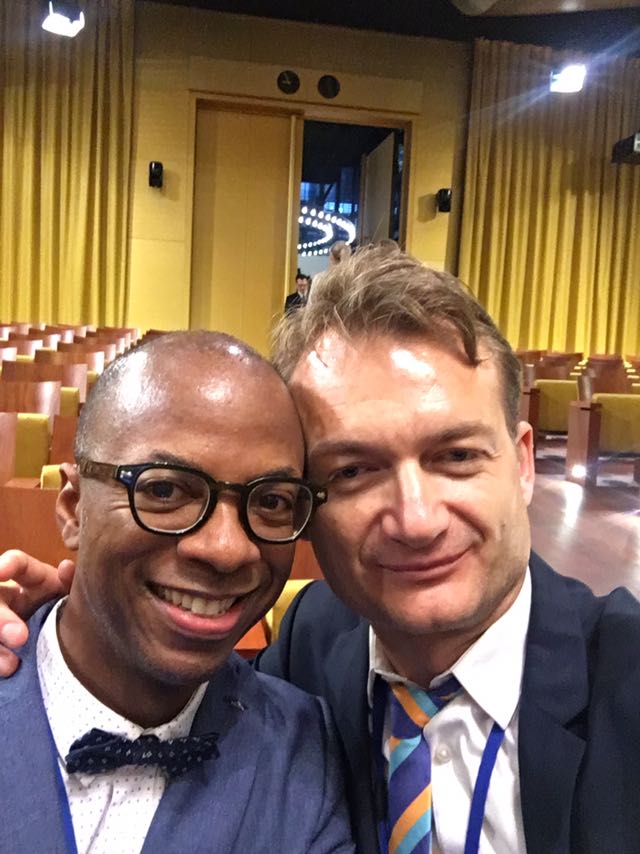
In a landmark decision, issued this morning in what has come to be known as ‘the Coman case’, the Court of Justice of the European Union has defined the term ‘spouse’ for the purposes of freedom of movement for the first time.
The CJEU judgment confirms that same-sex spouses of EU citizens are included in the definition, after a positive recommendation from the case’s Advocate General in January.
In a press release published this morning, the court notes that “…in the directive on the exercise of freedom of movement the term ‘spouse’, which refers to a person joined to another person by the bonds of marriage, is gender-neutral and may therefore cover the same-sex spouse of an EU citizen…”.
Today’s judgment means that all EU Member States must treat same-sex couples in the same way as different-sex couples when they exercise freedom of movement rights. Same-sex spouses of EU nationals must now be recognised and granted residence rights on an equal basis.
“Equality, fairness and pragmatism were at the core of today’s verdict from Luxembourg. The CJEU has acknowledged that rainbow families should be recognised equally in the eyes of the law on freedom of movement. Now we want to see the Romanian authorities to move swiftly to make this judgment a reality.” said Evelyne Paradis, ILGA-Europe Executive Director, as the decision was announced.
This momentous decision is the result of a lengthy legal challenge brought by Adrian Coman and Clai Hamilton, supported by Accept Association.
“We can now look in the eyes of any public official in Romania and across the EU with certainty that our relationship is equally valuable and equally relevant, for the purpose of free movement within the EU. We are grateful to the EU Court and to the many people and institutions who have supported us, and through us, other same-sex couples in a similar situation. It is human dignity that wins today.” commented Adrian Coman this morning.
The Coman case clears up the legal uncertainty that many rainbow families currently face – on the one hand, EU law provided protection against sexual orientation discrimination and allowed for freedom of movement, but the EU’s law also left couples at the intersection of these situations in legal limbo. Following today’s ruling, that contradictory scenario will be eradicated.
“From the first moment that ILGA-Europe intervened as a third party in the Coman proceedings at national level in 2016, we could see the immensely positive impact the case could have. It will increase legal protection and certainty for same-sex couples – something that should not be underestimated. This clarity will be felt not just by couples in Romania, but all over the EU, highlighting the power of strategic litigation and the enduring relevance of the EU and its laws in people’s lives.” remarked Arpi Avetisyan, ILGA-Europe Litigation Officer.
Romania currently sits at 35th place out of 49 countries on ILGA-Europe’s Rainbow Europe ranking of LGBTI law and policy and same-sex couples currently have no legal protection.
Romani?a Iordache, Vice President of ACCEPT Association and member of the legal team reacted: “Today, Adrian, Clai and ACCEPT won a great victory for same-sex couples across Europe. Starting from this moment onward, all EU norms applying to spouses should also equally to all same-sex families. Romanian authorities now have an obligation to respect the CJEU decision, and ensure residency rights and minimal recognition for all same-sex families in a similar situation.”
ILGA-Europe send all our congratulations to Adrian, Clai and everyone who has supported them on this journey! Their experience means that, in future, same-sex couples and their families will be able to move within in the EU and live their lives free from barriers that once separated them from their family.
Read our Q&A on the Coman Case Judgement here.
- ACCEPT Association’s press release on the judgment is available here (in Romanian).
- In 2016, the Romanian Constitutional Court referred the case to the Court of Justice of the European Union, and on 21 November 2017, the Grand Chamber composed of 15 CJEU judges held a public hearing. The Court was being asked to interpret the word “spouse” in the context of EU law on freedom of movement.
- The Coman case relates specifically to freedom of movement; today’s decision does not have any automatic implications for EU Member States in relation to marriage legislation at national level.
- The full judgment is available from the Court’s website (in multiple languages); the CJEU’s initial press release is available here.
- A Q&A on the Coman case is available here.
The Coman Case: Q&A

The Court of Justice of the European Union delivered a judgment today, saying that the definition of ‘spouse’ in EU law on freedom of movement includes same-sex couples. Here are some your questions about the judgement answered.
The case was taken by Adrian Coman (who is a Romanian national) and Clai Hamilton (a US citizen). Clai had been unable to apply for a residence permit in Romania as the authorities do not recognise marriages between same-sex partners carried out abroad.
So, what does the Coman judgment mean for EU law purposes?
Now, the term ‘spouse’ in the Freedom of Movement Directive has been clarified. The Court has clearly stated that same-sex couples are included in the definition of spouses.
This clarification must be applied equally in all EU Member States, through their own national laws.
The Coman case is about the right to free movement of EU citizens and their families.
Today’s ruling is about free movement, one of the four fundamental freedoms guaranteed in the EU. According to EU, laws on marriage are decided by the individual Member States. So, the Coman case does not put any automatic obligation on Romania to introduce equal marriage, unless their government wants to.
What does the judgment mean for same-sex couples who are in the same situation as Adrian and Clai?
Married same-sex couples in Romania (or any other EU Member State) now know that they are considered ‘spouses’ for freedom of movement.
So, EU Member States are under an obligation to grant the spouse (including from a country outside the EU, like in the Coman case) of an EU citizen a residence permit in the same way they would grant permits to different-sex spouses.
Can EU Member States refuse to follow EU law?
In short, no. In this case, the Romanian courts must refuse to apply any national laws that are in conflict with EU law.
If Member States ignore Court rulings, then the European Commission can take legal action – called infringement procedures.
Budapest court rules foreign same-sex marriages must be recognised in Hungary
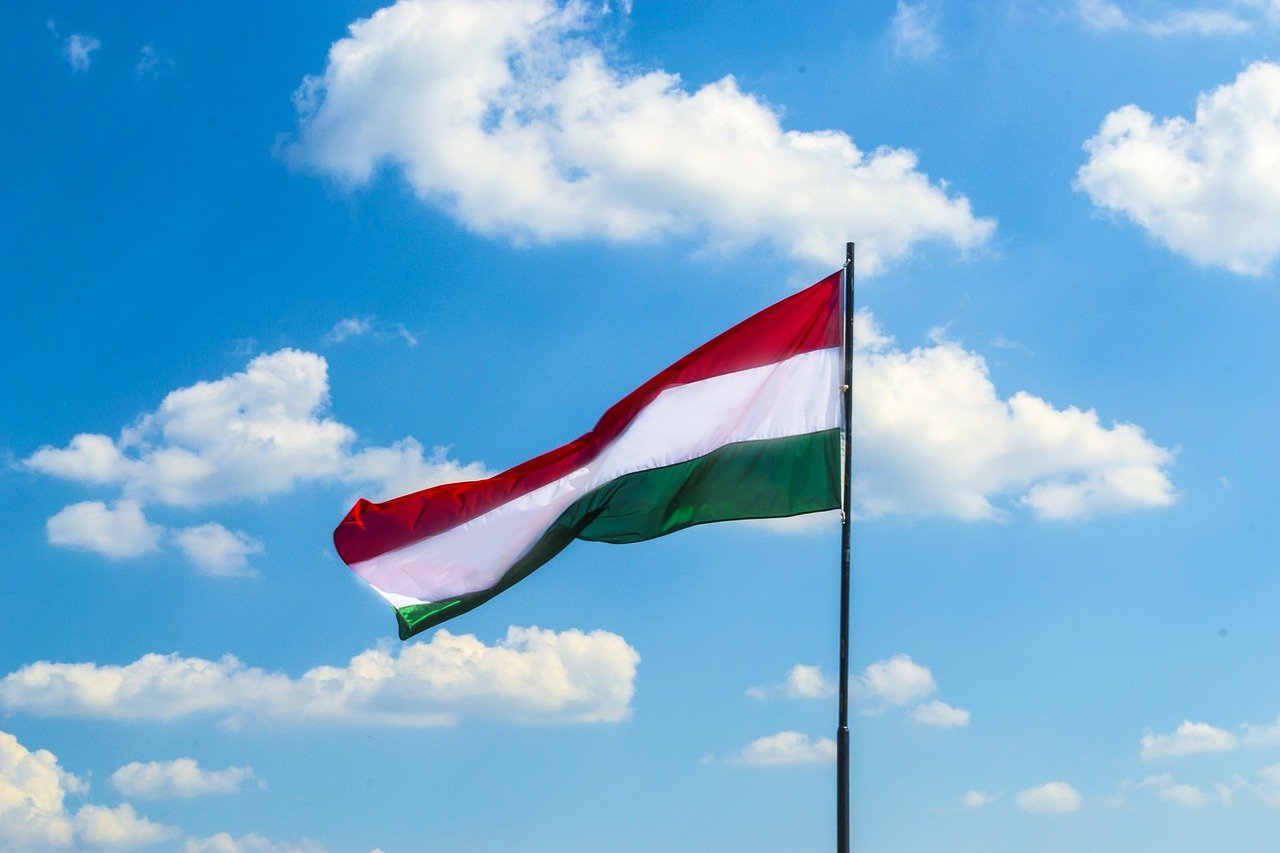
A judge at Budapest District Court has ruled that same-sex couples who have married outside Hungary have the right to their union being recognised as a registered partnership in Hungary.
The judgment of the court reaffirms the right to freedom of movement and family life of same-sex couples. The ruling established that foreign marriages should be recognised in Hungary as equivalent to registered partnerships, available in Hungary since 2009. This is an important development for the freedom of movement of same-sex couples wishing to settle in as a family in Hungary.
Yesterday the European Parliament adopted a resolution on protection and non-discrimination with regard to minorities, including LGBTI people, in EU member states. Among other measures, the Parliament called the Commission to “take action in order to ensure that LGBTI individuals and their families can exercise their right to free movement in accordance with both Article 21 of the TFEU and Article 21 of the EUCFR”.
These two developments echo the issues at stake in the Romanian Coman and Others case pending before the Court of Justice of the European Union (CJEU). A positive ruling from the CJEU would reaffirm the right to freedom of movement of same-sex couples at the European level.
According to the opinion of the Advocate General in this case the term “spouse” of the Freedom of Movement Directive includes same-sex spouses. Should the Court follow Advocate General’s opinion, it would mean huge step forward for equal treatment of all EU citizens to move freely across the EU.
Freedom of movement and same-sex couples in Romania – coman case update

Same-sex spouses are included in the definition of ‘spouse’, for the purposes of freedom of residence of citizens of the EU and their family members. This is the opinion of the Advocate General assigned to examine questions on the right to free movement of EU citizens raised by Adrian Coman and his husband Clai Hamilton.
In this morning’s press release, Advocate General Wathelet clearly notes that while EU Member States are free to decide on their own marriage legislation, they may not impede an EU citizen’s freedom of residence by refusing to grant their same-sex spouse residence.
ILGA-Europe are excited by today’s announcement. As third party interveners in the Coman case at national level, ILGA-Europe have been following developments in this case every step of the way, receiving regular updates from our member organisation ACCEPT Association.
The points raised by the Advocate General’s opinion are very encouraging. This also marks another important milestone for Adrian Coman and Clai Hamilton. They are now one step closer to an answer, potentially one step closer to protection for their own family and one step closer to clarity for lots more rainbow families.
Who are Adrian and Clai?
Adrian Coman (born in Romania) and Clai Hamilton (a US citizen) were married in Belgium in 2010 but are not recognised as a family by the Romanian authorities. The couple have not been able to live together in Romania as a result and began legal action over five years ago to rectify this.
In 2016, the Romanian Constitutional Court referred the case to the Court of Justice of the European Union, and on 21 November 2017, the Grand Chamber composed of 15 CJEU judges held a public hearing. The Court was being asked to interpret the word “spouse” in the context of EU law on freedom of movement.
Romania currently sits at 35th in the Rainbow Europe ranking on law and policy.
What is an Advocate General and what does today’s announcement mean?
The 11 Advocates General are independent legal advisers who assist the CJEU’s judges. Their role is an advisory, but influential, one. They take a detailed look at the legal aspects of the case assigned to them, analyse the problem and suggest a solution.
Their impartial advice, called an ‘opinion’, is not legally binding. (As a result, the court does not have to follow their advice and may issue a decision that differs from what the AG suggests today.) This marks the end of the oral hearing stage of the Coman case. Now, the judges will deliberate before issuing their final decision.
When will the final decision be made?
At this point, there is no set timetable for when the judgment in the case will be delivered; however, ACCEPT Association and the legal team supporting the Coman Hamilton family have noted that these particular proceedings have been dealt with quite promptly to date and expect a decision in spring 2018.
How has the opinion been received?
ACCEPT Association has noted “…the Advocate General’s Opinion supports all the arguments ACCEPT and the plaintiffs have put forward to European judges…” and Adrian Coman remarked that “…we can no longer be treated as inferior citizens without equal rights on the basis of the prejudices that some people have about homosexuality.”
- For more reaction from member organisation ACCEPT, Adrian, Clai and their legal team, read their latest statement here.
- The Advocate General’s opinion has also been published in full on the Court’s website.
- The initial press release on the opinion is available in PDF format here.
- Video footage (in FR) from the CJEU is available via the European Commission’s audiovisual services.